|
|
|
Sort Order |
|
|
|
Items / Page
|
|
|
|
|
|
|
| Srl | Item |
| 1 |
ID:
132540
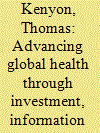

|
|
|
|
|
| Publication |
2014.
|
| Summary/Abstract |
The past decade has witnessed unprecedented levels of investment and engagement in global health spurred by the global HIV/AIDS crisis, the development of the Millennium Development Goals, momentum in polio eradication, and global outbreaks of infectious diseases such as SARS with its US$40 billion cost to society. Characterized by a sense of urgency, pragmatism, and opportunity, global health services and public health systems are being advanced to respond to rapidly expanding demands with dramatic results. However, much more remains to be done. After a decade in emergency mode, the next phase of global health work requires an even more precise approach and smarter investments. Many "donor" nations and organizations have tightened their belts in response to the recent economic downturn, while at the same time increasing the numbers of "recipient" countries, and are now better able to invest more of their own resources to benefit and protect their own citizens. In this climate, global health investments in programs and innovations must be better targeted and better informed by strategic information more than four-fold from US $6.7 billion in 1993 to US $28.4 billion in 2011. Accompanying this investment was a striking decline in mortality in children under five years of age from 12.6 million deaths in 1990 to 6.6 deaths million in 2012. Improvements in health are not the only positive outcome of these investments. The same Commission concluded that global health is a smart investment - for every dollar invested in health, it can be expected that there will be a 10-20 fold return in economic benefit to society. Healthier people are more productive and contribute back to the economy. Healthier people also lower health care costs, naturally, by requiring less care.
|
|
|
|
|
|
|
|
|
|
|
|
|
|
|
|
| 2 |
ID:
132541
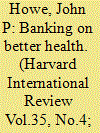

|
|
|
|
|
| Publication |
2014.
|
| Summary/Abstract |
HIV is no longer a death sentence" - that hopeful declaration-which would have been unthinkable even a decade ago- has now become a cliché by repetition whenever experts, physicians, academics and journalists gather to chart progress in fighting the disease and to set goals for the future. But for many people, sadly, that statement is not actually true. There remains no cure for the disease, and not everyone can get access to the anti-retrovirals (ARVs) that have done so much to help so many. This reflects the painful truth that poverty remains a major impediment to good health in the developing and even the developed world.
|
|
|
|
|
|
|
|
|
|
|
|
|
|
|
|
| 3 |
ID:
124510
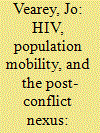

|
|
|
|
|
| Publication |
2013.
|
| Summary/Abstract |
As with many issues associated with the movement of people, linkages between mobility, HIV, conflict and post-conflict settings have often been based on conjecture rather than fact. Conflict was assumed to increase transmission of HIV, and displaced populations, refugees and armed forces were presumed to have higher HIV prevalence than host communities. However, recent evidence challenges these assumptions. This article explores the complex relationship between HIV and post-conflict settings, and considers if and how migrants and mobile populations - including returning refugees - are at increased risk of HIV acquisition in post-conflict settings.
|
|
|
|
|
|
|
|
|
|
|
|
|
|
|
|
| 4 |
ID:
124514
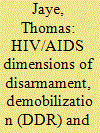

|
|
|
|
|
| Publication |
2013.
|
| Summary/Abstract |
Countries emerging from conflict situations face enormous social, economic, security and political challenges. Contemporary conflicts tend to lead to state and societal collapse, and are characterized by sexual violence and the destruction of fragile economies. Ensuring a safe and secure post-conflict environment for the pursuit of normal life is integral to post-war reconstruction and development processes, and post-conflict environments offer entry points for addressing both the origins and the effects of wars. Accordingly, this article argues that disarmament, demobilization and reintegration (DDR), and security sector reform (SSR), provide important opportunities for incorporating HIV/AIDS issues into broader national security frameworks. Further, the article argues that securitizing HIV/AIDS can ensure that responses to the epidemic are prioritized, but also that the treatment of security personnel should not be privileged over treatment of those who are infected in the larger population.
|
|
|
|
|
|
|
|
|
|
|
|
|
|
|
|
| 5 |
ID:
124515
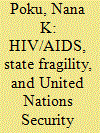

|
|
|
|
|
| Publication |
2013.
|
| Summary/Abstract |
When, in 2000, the United Nations Security Council (UNSC) discussed a global response to the growing HIV/AIDS pandemic, it was the first time in the institution's history that its members had debated a non-mandated issue. The preserve of this institution had, until then, been focused on preventing wars and the proliferation of weapons of mass destruction. Yet the mounting evidence on the societal impacts of HIV/AIDS was no less devastating for affected communities. In most heavily affected societies, the prevalence of HIV/AIDS doubled in less than ten years. But was the case that led to UNSC Resolution 1308 overstated? This article revisits the case that led to the Security Council meeting and argues that, far from being overstated, Resolution 1308 helped to avert a crisis of unimaginable proportions.
|
|
|
|
|
|
|
|
|
|
|
|
|
|
|
|
| 6 |
ID:
124511
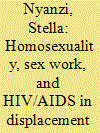

|
|
|
|
|
| Publication |
2013.
|
| Summary/Abstract |
This article aims to disrupt the silence, invisibility and erasures of non-heteronormative sexual orientations or gender identities, and of sex work, in HIV/AIDS responses within displacement and post-conflict settings in Africa. Informed by Gayle Rubin's sexual hierarchy theoretical framework,1 it explores the role of discrimination and violation of the rights of sex workers and of gender and sexual minorities in driving the HIV/AIDS epidemic during displacement. Specific case materials focus on ethnographic research conducted in urban and rural Uganda. Recommendations for policy, practice and programmes are outlined.
|
|
|
|
|
|
|
|
|
|
|
|
|
|
|
|
| 7 |
ID:
124513


|
|
|
|
|
| Publication |
2013.
|
| Summary/Abstract |
This article explores masculinities in post-conflict contexts in Africa and the need for their transformation. It commences with an examination of the constructs of masculinity and masculinities, and presents perspectives on masculinities in Africa, including possible sources of gender conditioning on the continent. The article then reviews the main roles that men play and the various conditions that confront them during and after violent conflicts in Africa, and examines particular features and challenges that men and their masculinities face in African post-conflict societies. Lastly, the article reviews some practical interventions that aim to transform masculinities in various contexts, and suggests possible avenues towards more effective and sustainable transformation.
|
|
|
|
|
|
|
|
|
|
|
|
|
|
|
|
|
|
|
|
|